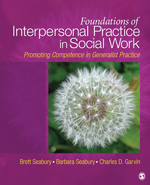
This text takes a broad based approach to basic generalist practice methods that emphasize the common elements in working with individuals, families and groups. The goal of the book is to teach social work students how to enhance clients' social functioning by helping them become more proficient in examining, understanding, and resolving clients' social problems. The authors pay special attention to enhancing social justice by working with individuals and families who have been historically oppressed. This edition includes specific integrated coverage of the Council on Social Work Education's (CSWE) latest Educational Policy and Accreditation Standards (EPAS).
Intended Audience
This core text is designed for advanced undergraduate and graduate students enrolled in the introductory Direct Practice and Generalist Practice courses in BSW and MSW programs of social work.
ISBN: 9781544350080
eBook
Suggested Retail Price: $94.24
Bookstore Price: $75.39
ISBN: 9781544350080
eBook
Suggested Retail Price: $52.00
Bookstore Price: $41.60
ISBN: 9781544350080
eBook
Suggested Retail Price: $58.00
Bookstore Price: $46.40
ISBN: 9781544350080
eBook
Suggested Retail Price: $65.00
Bookstore Price: $52.00
ISBN: 9781412966825
Hardcover
Suggested Retail Price: $195.00
Bookstore Price: $156.00
ISBN: 9781412966832
Paperback
Suggested Retail Price: $135.00
Bookstore Price: $108.00
See what’s new to this edition by selecting the Features tab on this page. Should you need additional information or have questions regarding the HEOA information provided for this title, including what is new to this edition, please email sageheoa@sagepub.com. Please include your name, contact information, and the name of the title for which you would like more information. For information on the HEOA, please go to http://ed.gov/policy/highered/leg/hea08/index.html.
For assistance with your order: Please email us at textsales@sagepub.com or connect with your SAGE representative.
SAGE
2455 Teller Road
Thousand Oaks, CA 91320
www.sagepub.com
Preface
Acknowledgments
Definition of Social Work
Interpersonal Practice
Use of Ecological Concepts
The Scope of Practice
The Bases of Interpersonal Practice
Summary
Rationale
Underlying Assumptions
Metaphors
Basic Concepts: Client, Worker; Target, and Action Systems
Summary
The Ideology of the Social Work Profession
The Social Work Code of Ethics
Value Conflicts in Practice
Practice Cases With Ethical Issues
Summary
What is Critical Consciousness?
Mayor Dimensions of Multiculturalism and Some Terminology
Key Social Group Categories and Related Terminology
How Do Multiple Identities Work?
Routes to Critical Consciousness and Multicultural Competence
The Application of Critical Consciousness to Practice
Summary
Recognition of Violence and Trauma
Types of Trauma
Assessment of Trauma
Consequences of Trauma: Symptoms of Psychological and Emotional Injury
Treatment Options
Risk Screening Protocols
Summary
Definition of the Social Work Relationship
Power Dimensions in Professional Relationships
Stages of the Professional Relationship
Transactional Nature of the Professional Relationship
Why Is Relationship So Important?
Conscious Use of Self
Importance of Hope
The Initiation of Relationships
Relationships in Group Situations
Relationships in Family Situations
Summary
Definition of a Client
Overview of the Clienthood Process
Pathways to Clienthood
The Entry Process
The Worker's Tasks With Applicants
Tasks With Nonclients
"Significant Others" in the Client's Life
Defining the Client in a Multiperson Client System
Agency Conditions and Definitions of Client
Continuance and Discontinuance
Orientation to the Client Role
The Initiation of Problem Solving
The Preliminary Contract
Summary
Components of a Social Work Contract
Characteristics of a Social Work Contract
Value of the Contract Approach
Limits of Contracting
Contracting With Families and Groups
Summary
Monitoring
Evaluation
Side Effects
Summary
Purposes of Assessments
Issues in Use of Sources
Individual Assessment Framework
Stress Assessment
Crisis Assessment
Assessment as a "Label"
PIE - The Person-in-Environment System
Summary
The Context of Interpersonal Change
Interventive Roles
Overcoming Barriers
Crisis Intervention
Role Solutions
Summary
What Is a Family?
Measurement of System Variables
Family Assessment
The Process of Family Assessment
Obtaining Family Assessment Data
Categorizing Family Circumstances
Ways of Portraying Family Conditions
Summary
Occasions for Family Interventions
Prior to the First Family Session
The Initial Sessions
The Family Change Stage
Phase of the Family Life Cycle
Endings
Summary
Types of Groups
Therapeutic/Effectiveness Variables
Group Development
Assessing Group Dynamics
Summary
Working With Elders in a Support Group
First Group Session
Second Group Session
The First Session of a Closed Group
Leadership Interventions
Interpersonal Conflict in Groups
Conclusion
Summary
Organizational Assessment
Community Assessment
Summary
Ethics of Organizational and Community Change
Theories of Organizational Change
Community Change
Summary
The Tasks of Termination
Termination Issues in Group Work
Termination Issues With Families
Worker Termination
Problematic Terminations
Summary
Bibliography
Index
About the Authors
The following materials will be available on the instructor teaching site:
- Sample syllabus
- Teaching tips
- Test bank
- PowerPoint slides
- Web resources
The following materials will be available on the student study site:
- Student quizzes
- Journal articles and discussion questions
- Web resources
New and Retained Features
- Weaves content about diversity issues throughout and includes a separate chapter, written by renowned experts, on economically and socially oppressed groups
- Emphasizes the value and ethical considerations that underlie interpersonal practice, with an emphasis on enhancing individual-environmental transactions
- Features practice case examples in each chapter, including challenging cases involving an applicant who is mandated to see the practitioner, to encourage students to act as the interpersonal practitioner and to comment on the actions taking place in the case narrative · Offers two new chapters focusing on social work values and contemporary practice issues, including a chapter on violence and trauma
- Includes a full chapter devoted to the importance of monitoring and evaluation in practice that can be readily implemented, such as the new Visual Analogue Scale (VAS)
- Opens each chapter with a case example, quote, or exercise that introduces primary themes and draws the reader into the chapter's content

